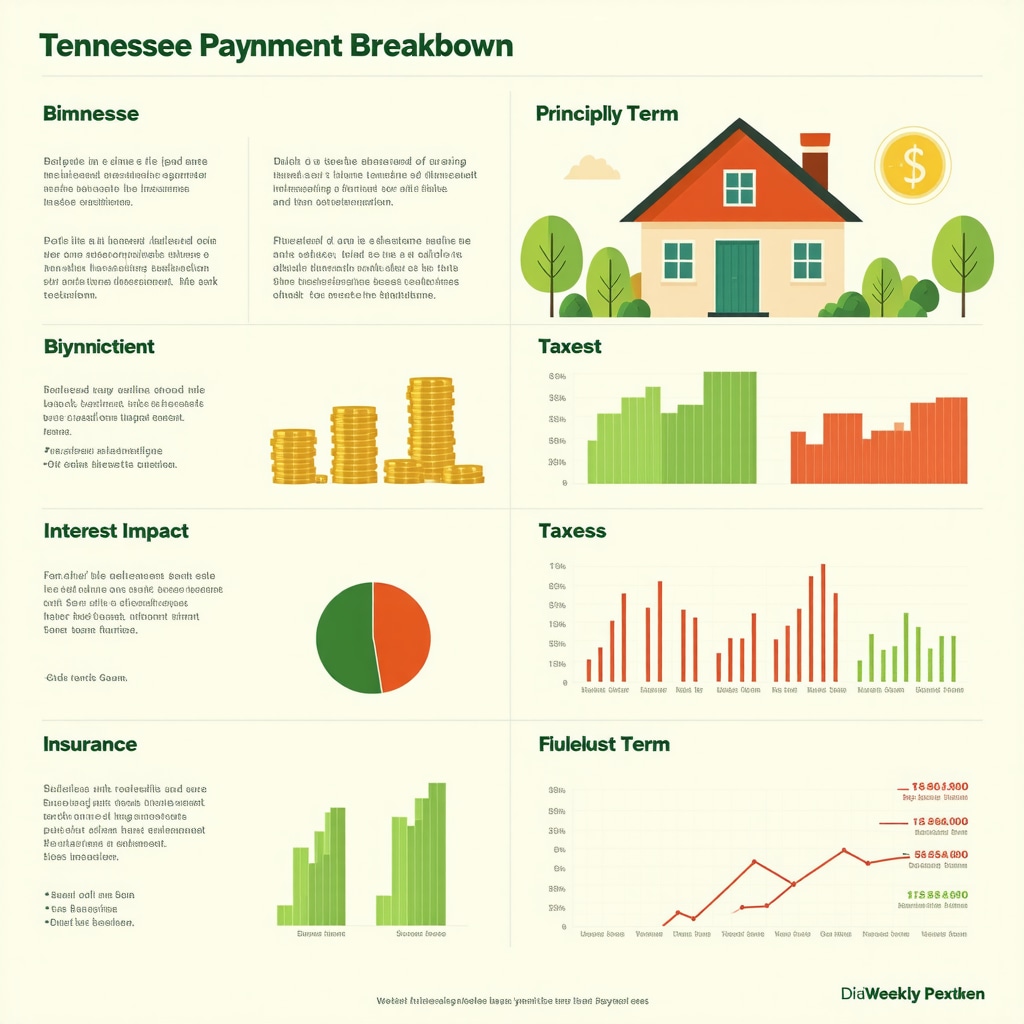Unlocking the Secrets of Mortgage Interest Calculation in Tennessee
Buying a home in Tennessee often means navigating a complex financial landscape, where understanding how mortgage interest is calculated can save you thousands. This step-by-step guide unpacks the intricacies behind mortgage interest for Tennessee loans, empowering you with expert knowledge to make informed decisions and optimize your loan costs.
Breaking Down Tennessee Mortgage Interest: More Than Just a Percentage
Mortgage interest isn’t a static figure; it reflects the cost you pay over time for borrowing money to purchase your home. In Tennessee, factors like loan type, credit score, and local market trends influence your interest rate. Understanding these subtleties is critical. For instance, conventional loans may offer different interest rate structures compared to FHA or VA loans, which are prevalent in the Tennessee market.
How Do Tennessee Mortgage Interest Calculations Impact Your Monthly Payments?
The most common method to calculate mortgage interest in Tennessee is the amortization formula, where each monthly payment partially covers the interest and partially reduces the principal. Early in the loan term, a larger portion of your payment goes toward interest. To calculate your monthly interest payment, multiply your current loan balance by your annual interest rate divided by 12. For example, with a $250,000 loan at 5% interest, your first month’s interest would be approximately $1,041.67.
Expert tip: Using an amortization schedule tailored to Tennessee loans helps you anticipate how your interest payments will evolve, especially if you consider refinancing. For deeper insights into refinancing strategies specific to Tennessee, explore this comprehensive guide.
Local Nuances: Tennessee-Specific Factors That Influence Your Mortgage Interest
Tennessee’s mortgage interest landscape is shaped by state-specific elements such as property taxes, insurance costs, and regional economic conditions. For example, Memphis and Nashville might exhibit different average mortgage interest rates due to local market competition and demand. Additionally, credit scores significantly affect your mortgage interest rate; improving your credit can lower your rate and save money over time. For a detailed look at credit’s role in Tennessee mortgages, visit How Credit Scores Shape Your Mortgage Interest Rates Today.
Step-by-Step Calculation: From Loan Amount to Interest Paid
- Identify your loan principal: This is the amount you borrow.
- Know your annual interest rate: The percentage charged yearly by your lender.
- Calculate monthly interest rate: Divide the annual rate by 12.
- Compute first month’s interest: Multiply your loan principal by the monthly interest rate.
- Use an amortization schedule: Track how much of each monthly payment goes to interest versus principal.
By following these steps, Tennessee homeowners can demystify their mortgage interest and plan their finances effectively.
Why Is Understanding Mortgage Interest Vital for Tennessee Homebuyers?
Knowledge of mortgage interest calculations equips you with the power to evaluate loan offers critically, negotiate better terms, and choose between fixed or adjustable rates wisely. Tennessee’s evolving mortgage market rewards borrowers who understand these details, as seen in current local trends and forecasts. To explore these trends further, check out Understanding Tennessee Mortgage Rates: Trends and Predictions 2025.
Ready to take control of your Tennessee mortgage journey? Share your questions or experiences below to join the conversation, or contact our Tennessee mortgage experts for personalized guidance tailored to your unique financial situation.
Authoritative source: For a foundational overview of mortgage interest concepts, the Consumer Financial Protection Bureau offers trusted resources at How is mortgage interest calculated?
Personal Reflections on Choosing Between Fixed and Adjustable Rates in Tennessee
When I first faced the choice between a fixed and an adjustable mortgage rate in Tennessee, the decision felt daunting. Fixed rates promised stability, which was comforting amid unpredictable markets. Adjustable rates, on the other hand, offered potentially lower initial payments but with the risk of future increases. I vividly remember sitting down with my mortgage broker, who patiently walked me through Tennessee’s local market trends and my financial goals. This conversation helped me realize that my long-term plan was to stay in my home for decades, making a fixed rate the safer bet.
Interestingly, many Tennessee buyers are now weighing similar decisions, especially with fluctuating rates in 2025. If you want to explore how these rate types stack up in the Tennessee context, the Navigating Fixed vs Adjustable Mortgage Rates Expert Guide 2025 offers a detailed breakdown that really helped clarify things for me.
Understanding the Real Cost: How Extra Payments Can Save Tennessee Homeowners Money
One lesson I learned the hard way was the power of making extra payments toward my principal. Early on, I stuck strictly to my monthly payment schedule, not realizing how much interest was accruing. A close friend, also a Tennessee homeowner, shared how she made biweekly payments instead of monthly ones. This strategy chopped years off her mortgage and saved her tens of thousands in interest.
Calculating how much you can save by accelerating payments might seem complicated, but tools like amortization calculators tailored to Tennessee loans make this much easier. According to the Consumer Financial Protection Bureau, even small additional payments can significantly reduce interest over time (source).
Have You Considered How Your Payment Schedule Affects Your Mortgage Interest?
I encourage you to reflect on your payment habits. Are you making the most of your money, or could small tweaks in your schedule unlock big savings? Sometimes, these personal finance strategies aren’t intuitive until you take a moment to examine them. Share your experiences or concerns in the comments below—I love hearing from Tennessee homeowners navigating these waters.
The Role of Tennessee Mortgage Brokers in Securing the Best Interest Rates
From personal experience, working with a knowledgeable local Tennessee mortgage broker was invaluable. They understood the nuances of our state’s lending environment and helped me secure a competitive rate that suited my financial profile. If you’re wondering how brokers can save you money and hassle, check out How Tennessee Mortgage Brokers Save You Money: What You Need to Know. Their expertise might be the difference between a good deal and a great one.
Remember, the journey to homeownership is personal and unique. Don’t hesitate to explore local resources, ask questions, and lean on experts who understand Tennessee’s market. Your mortgage interest rate is more than a number—it’s a reflection of your financial path and decisions.
Curious to dive deeper? Browse our other insightful guides, and if you have questions or want to share your story, leave a comment or contact us directly. We’re here to help you make the best choices for your Tennessee homeownership journey.
Leveraging Biweekly Payments: A Tactical Approach to Reducing Tennessee Mortgage Interest
Adopting a biweekly payment strategy can be a game-changer for Tennessee homeowners aiming to minimize mortgage interest over the loan’s lifespan. By splitting your monthly mortgage payment into two halves and paying every two weeks, you effectively make 13 full payments annually instead of 12. This seemingly subtle adjustment accelerates principal reduction, consequently decreasing the total interest accrued.
Mathematically, if you consider a $300,000 loan at a 4.5% annual interest rate amortized over 30 years, switching to biweekly payments can reduce the loan term by approximately 4 to 5 years and save tens of thousands in interest. However, borrowers must ensure their lender allows biweekly payments without penalties and confirm that extra payments are applied directly to the principal.
Dynamic Interest Rate Modeling: Predicting Tennessee Mortgage Costs Amid Economic Shifts
Advanced borrowers and investors increasingly employ dynamic interest rate models to forecast mortgage costs under varying economic conditions. Tennessee’s mortgage market, influenced by regional employment trends and federal monetary policies, requires nuanced modeling beyond static APR calculations.
Using stochastic interest rate models, such as the Cox-Ingersoll-Ross (CIR) framework, homeowners can simulate potential future interest rate paths and their impact on adjustable-rate mortgage (ARM) payments. This probabilistic approach empowers borrowers to make data-driven decisions about refinancing or locking in fixed rates based on forecasted market volatility.
How Can Tennessee Homebuyers Strategically Use Rate Forecasts to Optimize Mortgage Interest?
Strategic utilization of interest rate forecasts involves timing mortgage locking or refinancing decisions to align with favorable market windows. Tennessee buyers can subscribe to localized economic indicators, including regional labor market reports and Federal Reserve announcements, to anticipate interest rate movements.
Moreover, integrating these forecasts with personal financial objectives—such as intended homeownership duration and risk tolerance—enables tailored mortgage product selection. For example, if forecasts suggest rising rates, locking in a fixed-rate mortgage promptly might mitigate long-term interest costs, whereas expectations of rate declines could justify opting for an ARM or delaying refinancing.
For an in-depth understanding of these modeling techniques and their practical application in Tennessee, refer to the National Bureau of Economic Research working paper on mortgage rate forecasting, which provides empirical insights into interest rate dynamics affecting mortgage markets.
Integrating Property Tax and Insurance Considerations into Mortgage Interest Calculations
While mortgage interest forms a significant portion of monthly payments, Tennessee homeowners must also account for property taxes and homeowners insurance, which can indirectly influence perceived mortgage affordability and refinancing strategies.
Property tax rates vary across Tennessee counties, with areas like Davidson County (Nashville) exhibiting higher effective rates than rural counties. Incorporating these taxes into your monthly escrow calculations is crucial for accurate budgeting.
Insurance premiums similarly fluctuate based on property location, age, and risk factors such as proximity to flood zones. By factoring these into total housing costs, homeowners can better evaluate the cost-benefit of refinancing or accelerating payments.
Expert Tip: Crafting a Comprehensive Mortgage Cost Projection Model
To obtain a holistic view of your mortgage obligations, integrate principal, interest, taxes, and insurance (PITI) into a dynamic spreadsheet model. Include scenarios for varying interest rates and payment schedules to visualize long-term financial impacts. This approach elevates your financial planning from reactive to proactive, a hallmark of sophisticated Tennessee homeowners.
Have you begun modeling your mortgage payments with these elements? Share your techniques or questions below, or connect with our Tennessee mortgage experts for personalized assistance in developing your customized mortgage strategy.

Harnessing Predictive Analytics for Tennessee Mortgage Rate Optimization
In the contemporary mortgage landscape, leveraging predictive analytics can substantially refine how Tennessee homeowners approach mortgage interest rates. By integrating machine learning algorithms with local economic indicators, borrowers can forecast rate fluctuations with increased precision, enabling proactive refinancing and locking strategies. This data-driven methodology transcends traditional static models, offering a nuanced understanding of rate volatility specific to Tennessee’s diverse housing markets.
What Are the Most Effective Predictive Models for Tennessee Mortgage Interest Rate Forecasting?
Among the array of predictive models, time-series analyses such as ARIMA (AutoRegressive Integrated Moving Average) and ensemble learning techniques including Random Forests have demonstrated robust performance in mortgage rate forecasting. When calibrated with Tennessee-specific variables—such as regional employment rates, housing inventory levels, and historical Federal Reserve policy shifts—these models can deliver dynamic projections that inform optimal timing for mortgage locking or refinancing decisions.
For a comprehensive exploration of such methodologies, the National Bureau of Economic Research working paper on mortgage rate forecasting offers authoritative insights into the application of these statistical techniques in real-world mortgage markets.
Mitigating Interest Costs via Strategic Payment Structuring in Tennessee
Beyond biweekly payments, Tennessee homeowners can explore alternative payment structures such as accelerated principal prepayments and lump-sum contributions aligned with tax refunds or bonuses. These strategies exponentially reduce the amortization period and cumulative interest, particularly when executed during the early stages of the loan term.
In practice, coupling these payments with precise amortization schedules tailored for Tennessee loan products ensures that each dollar optimally reduces principal rather than interest. This level of strategic payment planning demands meticulous record-keeping and collaboration with lenders to confirm the correct application of extra payments.
Evaluating the Impact of Tennessee’s Property Tax Variability on Mortgage Interest Calculations
Property tax heterogeneity across Tennessee counties introduces an additional layer of complexity in mortgage affordability analyses. For instance, Davidson County’s elevated property tax rates amplify monthly escrow obligations, indirectly influencing borrowers’ capacity to allocate funds toward principal and interest payments.
Integrating Geographic Information System (GIS) data with mortgage calculators enables homeowners and financial advisors to visualize and simulate total housing costs, inclusive of fluctuating property tax burdens. This holistic approach informs more accurate budgeting and can prompt strategic decisions such as property selection or refinancing timing to mitigate tax impacts.
Expert Insight: Implementing a Holistic Mortgage Cost Model for Tennessee Homeowners
A truly comprehensive mortgage cost model synthesizes principal, interest, taxes, insurance (PITI), and even maintenance expenses to project long-term financial commitments accurately. Advanced Excel modeling or specialized financial software can incorporate variable interest rate scenarios, payment frequency options, and local tax rate changes, empowering Tennessee homeowners with actionable foresight.
Have you integrated these components into your mortgage planning? Engage with our Tennessee mortgage experts for bespoke modeling solutions that accommodate your unique financial landscape and goals.

Unlocking Value Through Tennessee Mortgage Broker Expertise
Expert mortgage brokers in Tennessee not only negotiate competitive interest rates but also provide critical insights into lender-specific nuances, loan product eligibility, and state regulatory considerations. Their localized expertise can uncover opportunities for interest rate reductions that generic online calculators might overlook.
Engaging with a seasoned Tennessee mortgage broker early in the homebuying or refinancing process can substantially enhance your financial outcomes, ensuring your mortgage structure aligns with both market conditions and personal financial objectives.
Ready to elevate your mortgage strategy with advanced insights and personalized guidance? Contact our Tennessee mortgage specialists today and transform your home financing experience.
Frequently Asked Questions (FAQ)
What factors most influence mortgage interest rates in Tennessee?
Mortgage interest rates in Tennessee are shaped by a combination of borrower-specific factors such as credit score, loan amount, and loan type (conventional, FHA, VA), as well as macroeconomic conditions like federal monetary policy and regional housing market dynamics. Local elements such as property taxes and insurance costs also indirectly affect the total mortgage expense.
How does an amortization schedule help Tennessee homeowners understand mortgage interest?
An amortization schedule breaks down each monthly payment into interest and principal components over the loan term. For Tennessee homeowners, this tool clarifies how early payments predominantly cover interest, while later payments reduce principal more significantly. It also assists in planning refinancing or extra payments to reduce interest costs.
Are biweekly mortgage payments beneficial in Tennessee, and how do they impact interest?
Yes, biweekly payments can accelerate principal reduction by effectively making one extra monthly payment annually. This strategy shortens the loan term and reduces total interest paid. However, Tennessee borrowers should confirm lender policies to ensure extra payments apply directly to principal without penalties.
How do property taxes varying across Tennessee counties affect mortgage affordability?
Property tax rates differ widely across Tennessee counties, influencing the monthly escrow portion of mortgage payments. Higher taxes in counties like Davidson increase monthly obligations, potentially reducing funds available for principal and interest payments, thus impacting overall mortgage affordability and refinancing decisions.
What is the advantage of using dynamic interest rate modeling for Tennessee mortgages?
Dynamic interest rate models simulate potential future rate fluctuations based on economic indicators, helping Tennessee borrowers anticipate changes in adjustable-rate mortgage payments. This foresight supports strategic decisions about locking in fixed rates or refinancing, optimizing long-term mortgage interest expenses.
How can Tennessee homebuyers leverage predictive analytics for mortgage rate optimization?
By integrating localized economic data with machine learning models like ARIMA or Random Forests, Tennessee buyers can forecast interest rate trends and identify optimal timing for mortgage locking or refinancing. This data-driven approach enhances decision-making beyond traditional static rate estimates.
Why is it important for Tennessee homeowners to incorporate insurance and maintenance costs into mortgage planning?
Homeowners insurance and maintenance expenses contribute to total housing costs beyond principal, interest, taxes, and insurance (PITI). Accounting for these ensures comprehensive budgeting and prevents unexpected financial strain, enabling more accurate assessment of mortgage affordability and repayment strategies.
How do Tennessee mortgage brokers add value in securing competitive interest rates?
Local Tennessee mortgage brokers possess deep knowledge of state-specific lender practices, loan products, and regulatory requirements. Their expertise enables them to negotiate better rates, identify suitable loan options, and navigate complex paperwork, ultimately saving borrowers money and time.
Trusted External Sources
- Consumer Financial Protection Bureau (CFPB) – Provides authoritative explanations and calculators for mortgage interest calculations, essential for foundational understanding and practical tools tailored to U.S. borrowers.
https://www.consumerfinance.gov/ask-cfpb/how-is-mortgage-interest-calculated-en-1694/ - National Bureau of Economic Research (NBER) – Offers advanced research papers on mortgage rate forecasting and economic modeling, including studies applicable to Tennessee’s mortgage market dynamics.
https://www.nber.org/papers/w24696 - Tennessee Department of Finance and Administration – Source for detailed county-level property tax rates and related regulations, critical for integrating tax considerations into mortgage affordability analyses.
https://www.tn.gov/finance/ - Mortgage Bankers Association (MBA) – Industry-leading data and reports on mortgage rates, loan products, and market trends specific to the U.S. and regional markets including Tennessee.
https://www.mba.org/ - Tennessee Housing Development Agency (THDA) – Provides state-specific mortgage assistance programs, educational resources, and insights into local housing market conditions.
https://thda.org/
Conclusion
Understanding how mortgage interest is calculated in Tennessee unlocks significant financial advantages for homebuyers and homeowners alike. From grasping amortization intricacies and leveraging biweekly payment strategies to incorporating local property taxes and employing predictive analytics, Tennessee borrowers can craft personalized, forward-looking mortgage plans that minimize interest costs and enhance affordability. Partnering with experienced Tennessee mortgage brokers further refines this process, ensuring access to competitive rates and tailored loan products. Armed with expert insights and comprehensive cost models, Tennessee homeowners are empowered to navigate the evolving mortgage landscape with confidence and strategic foresight. Share your thoughts, questions, or experiences below, or explore our extensive guides to continue mastering your Tennessee home financing journey today.

